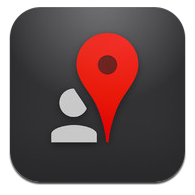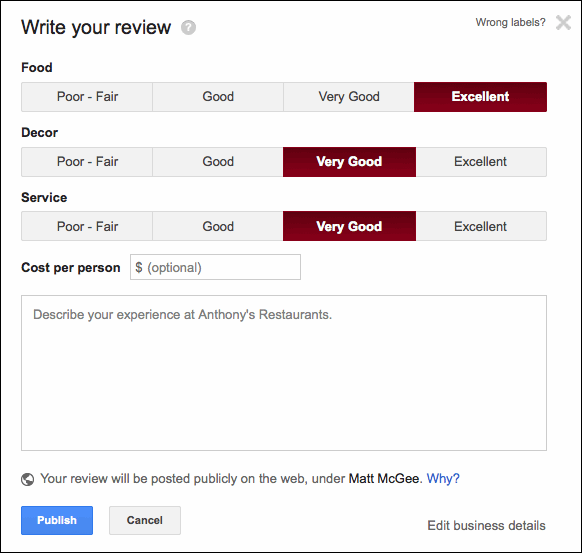Google Starts To Downplay Zagat Scores; It Should Ditch Them Altogether
Google is changing the way it collects local business reviews and displays them in search results, making the Zagat score a less prominent piece of information. That’s a good thing in my opinion, and many people — myself included — hope it’s the first step toward the complete removal of the Zagat system in Google’s […]

That’s a good thing in my opinion, and many people — myself included — hope it’s the first step toward the complete removal of the Zagat system in Google’s local business ecosystem.
In a Google+ post yesterday, Megan Stevenson explains that review authors no longer have to use the Zagat scoring system and can instead just choose words/phrases like “Very Good,” “Excellent” or “Poor – Fair” to describe a business. Here’s Google’s new interface for writing a review:
That’s different from the Zagat system, which asks users to rate businesses on a non-standard 0-3 scale. While most review writers are used to “3” being the same as “okay” or “good,” in the Zagat system it’s the highest score you can give a business. Google would then convert those 0-3 ratings into an even more confusing Zagat score that ranged from 0-30.
That’s not the only change Google has made, though.
As Mike Blumenthal reported, Google has also stopped showing the Zagat numerical scores that are associated with individual reviews — and has replaced those with the same sentiment-style words/phrases.
As you can see, the overall Zagat score still shows on this Google+ business listing, but the individual reviews no longer show numerical scores.
In its announcement, Google says “…we’ll convert your ratings into numbers and factor them into the business’ precise 30-point score that shows up in Google+, Search and Maps.”
And it’s true that the Zagat scores are still visible when you search on both Google.com and in Google Maps, as shown below.
But eliminating the numerical scoring from review writing and review displays may be — and should be — a step toward eliminating the Zagat scoring system altogether.
The Problem With Zagat Scores In Local Search
In short: No one understands them.
As I’ve written on my own blog, Google took a big risk when it converted its entire local search/review system to a largely unfamiliar 30-point rating scale. Consumers are familiar with five-point (or five-star) rating scales — we use them to rate movies, music, books, products and much more. Most importantly, Google review authors were comfortable with seeing five-point/star ratings on Google, not to mention on popular local sites like Yelp, Bing and Yahoo Local.
I ask about this topic pretty regularly at search/local events, and I’ve yet to find anyone who prefers the Zagat scoring system. We’ve been trained to understand the five-star scale and seeing something like “This restaurant has a 21 overall score” doesn’t resonate as well with consumers nor with business owners.
My guess (and hope) is that we’ll see Google downplay the Zagat scores even further and eventually return to the more familiar five-star ratings. That seems like the smart thing to do.
Postscript, October 15: Google has notified us that Megan Stevenson has added a comment to her original post on Google+, which states that “this is not a departure from Zagat.” Here’s the full comment:
I’ve read a variety of reactions to my post last week about our update to the ratings scale in Google+ Local. Just wanted to be clear…this is not a departure from Zagat. We’ve simply built on what we’re learning from our Zagat colleagues and changed from numbers to labels to make it easier for people to enter their reviews. The time-tested, 30-point Zagat scale remains the same as it was before. More on how this 30-point rating is calculated here: https://support.google.com/plus/bin/answer.py?hl=en&answer=1723748
Opinions expressed in this article are those of the guest author and not necessarily Search Engine Land. Staff authors are listed here.
Related stories
New on Search Engine Land


